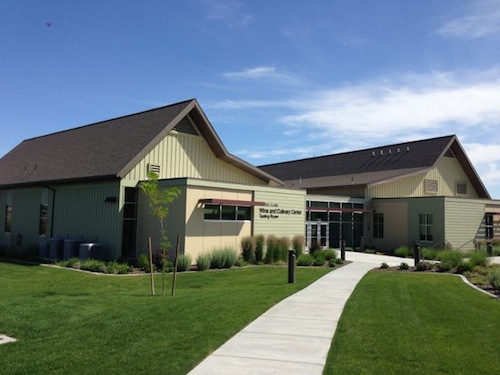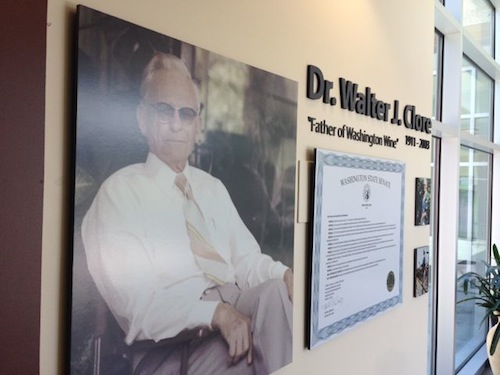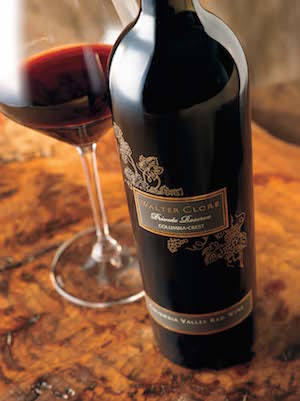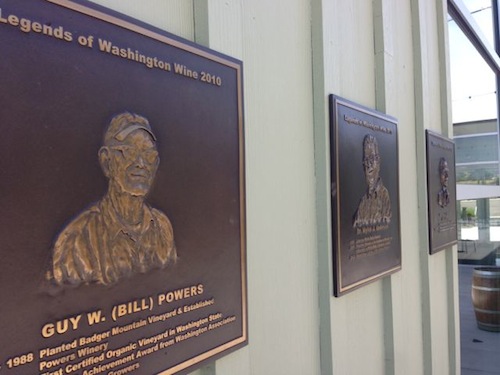
PROSSER, Wash. — Washington’s first winery opened in the 1870s, but Washington wine wasn’t really a serious business until a tall, lanky researcher from Oklahoma showed up in the 1930s and began to realize the possibilities of viticulture in Eastern Washington.
That man was Walter Clore, who today is hailed as “the father of Washington wine.”
In 2002, a movement began to create the Walter Clore Center in the Yakima Valley town of Prosser, where Clore spent much of his life after arriving here in 1937. Clore died in 2003, so he never saw the Clore Center open. After years of fundraising, the center was built on a bluff overlooking the Yakima River and opened a year ago.
We sat down with Abbey Cameron, executive director of the Walter Clore Wine and Culinary Center, to talk about how the first year went – as well as the lasting legacy the man had on one of Washington’s most important agricultural industries.
Here’s the interview:
[powerpress]
Please take a moment to click and leave an honest rating or review in the iTunes Store. It will help others learn about the wines of the Pacific Northwest.
Walter Clore ‘a Prosser guy’


Clore grew up in a teetotaling family in Oklahoma – his mother was a leader in the temperance union – so his family never had wine on the table when he was young. After coming to Washington, he began to envision what wine grapes could become to the region. He was far from the first and, in fact, received wine grape cuttings from two-time Sunnyside Mayor William B. Bridgman to get started.
But Clore was the first to apply science to the craft.
“Dr. Walter Clore was a Prosser guy through and through,” Cameron told Great Northwest Wine. “He started at what is now the WSU Irrigated Research Station here in Prosser, did his life’s work there and very early on in his career started focusing on wine grapes. He kind of latched onto the idea that the climate really could lend itself to some really great production.”
Cameron never met Clore, but she said his shadow still looms large in this small town about three hours east of Seattle.
“One of the great things about working here and actually living here in Prosser is how often I encounter stories of Dr. Clore,” she said. “People come to the center and tell us their stories. Even around town, we find people who knew him or saw him walking his dog on a daily basis. His presence is very real. He was a humble man. He loved nothing more than walking through a vineyard. Although he was a scientist and researcher, it was more than science to him, I think. There was a lot of art and heart behind it.”
Building the Walter Clore Center

The Clore Center’s origins predate Clore’s death in early 2003, but the project often stalled from a lack of funding and changes in the vision of what it should be. However, the center gained steam about a half-decade ago and opened in June 2014.
The 15,000-square-foot facility includes a tasting room, as well as space for events and banquets.
“It’s all connected by a beautiful patio that we love to use,” Cameron said.
The Walter Clore Center is home to the Legends of Washington Wine Hall of Fame, which each year inducts someone who has spent at least a quarter-century making significant contributions to the Washington wine industry. Last year, Allen Shoup, former CEO of Ste. Michelle Wine Estates and founder of Long Shadows Vintners in Walla Walla, was inducted. This year on Aug. 7, Don Mercer will be the 2015 inductee. Mercer planted the first wine grapes in the Horse Heaven Hills when he started Mercer Ranch Vineyards (now Champoux Vineyards) in 1972 with a block of Cabernet Sauvignon.
And now the Walter Clore Center is home to the Prosser Wine & Food Fair, which was held at the Art Fiker Stadium — home to the Prosser High School football field — for most of its first 33 years. This year, the festival will be expanded to include more wineries, and the $50 ticket will be all-inclusive.
“We’ve gotten rid of having script purchases,” Cameron said. “So your ticket includes all of your tasting.”
The Aug. 8 event also will include food trucks.
Walter Clore Center tasting room

The main feature of the Walter Clore Center is its spacious tasting room, just to the left as visitors enter the building. Each month, a different American Viticultural Area from Washington is featured, providing year-round educational opportunities.
“We focus on a different growing region of Washington every month,” Cameron said. “We will bring in anywhere from 10 to 12 wines that represent a specific region.”
May features the Columbia Gorge. June will focus on Red Mountain. Since September means “back to school” for many families, that month the Walter Clore Center features wines made by enology programs throughout the state, including Yakima Valley Community College in Grandview, Walla Walla Community College in Walla Walla, South Seattle Community College in West Seattle and Washington State University Tri-Cities in Richland.
“It’s a great story to tell,” Cameron said.
In addition, on the first Thursday of each month, the Clore Center plays host to a blind tasting of six wines made with the same grape variety. In June, the featured variety will be Lemberger, a favorite red grape of Walter Clore’s.
Walter Clore Center, not Wine Science Center

One issue that seems to come up often in Washington wine country is consumers mixing up the Walter Clore Center and the WSU Wine Science Center, which will open in August in Richland, about 30 miles away.
Cameron describes the facilities as two sides of the same coin.
“The Wine Science Center is a great fixture showing that Washington state has a tremendous investment in the future of this wine industry,” she said. “It’s the academic world, it’s the research world, and just really really important to make sure that this industry continues to thrive and survive.”
The Walter Clore Center, she said, focuses on wine lovers.
“We’re here for the consumer outreach and giving many, many wineries in Washington a chance for a little bit more exposure for consumers to learn more about the specific regions of Washington wine, learn their character, learn about the wineries and the stories there,” Cameron said. “And hopefully when the story comes full circle, they go visit that region after learning about it here.”
The storytelling will be enhanced in the years to come, as Cameron and her staff are working on creating exhibits that will provide interesting insights and history about the Washington wine industry.
To visit the Walter Clore Center, take Exit 82 from Interstate 82 in Prosser. The Clore Center is less than a minute off the freeway.

Leave a Reply